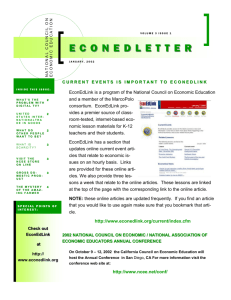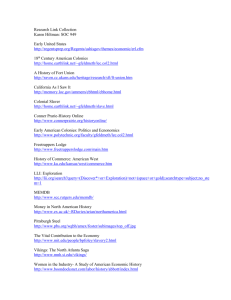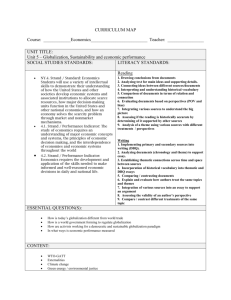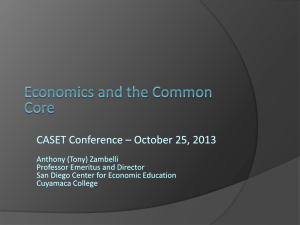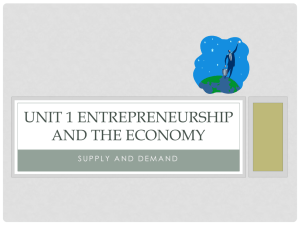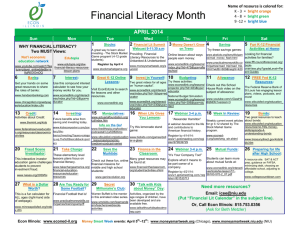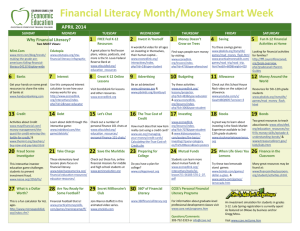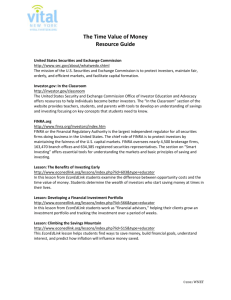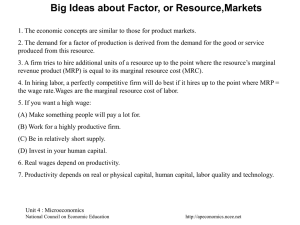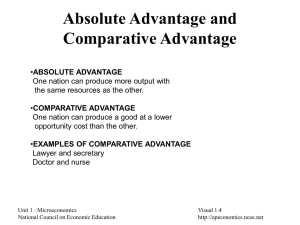econedletter - Digital Chalkboard
advertisement
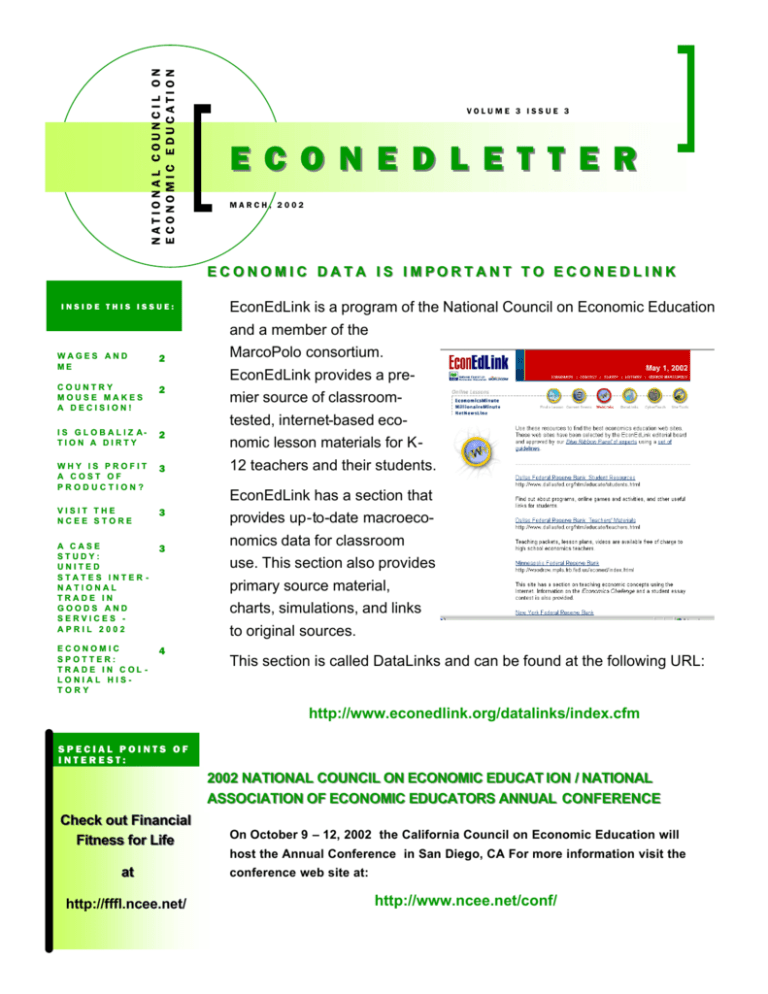
NATIONAL COUNCIL ON ECONOMIC EDUCATION VOLUME 3 ISSUE 3 E C O N E D L E T T E R MARCH, 2002 E C O N O M I C D A T A I S I M PO R T A N T T O E C O N E D L I N K INSIDE THIS ISSUE: WAGES AND ME 2 COUNTRY MOUSE MAKES A DECISION! 2 I S G L O B A L I Z ATION A DIRTY 2 WHY IS PROFIT A COST OF PRODUCTION? 3 VISIT THE NCEE STORE 3 A CASE STUDY: UNITED STATES INTER NATIONAL TRADE IN GOODS AND SERVICES APRIL 2002 3 ECONOMIC SPOTTER: TRADE IN COL LONIAL HISTORY 4 EconEdLink is a program of the National Council on Economic Education and a member of the MarcoPolo consortium. EconEdLink provides a premier source of classroomtested, internet-based economic lesson materials for K12 teachers and their students. EconEdLink has a section that provides up-to-date macroeconomics data for classroom use. This section also provides primary source material, charts, simulations, and links to original sources. This section is called DataLinks and can be found at the following URL: http://www.econedlink.org/datalinks/index.cfm SPECIAL POINTS OF INTEREST: 2002 NATIONAL COUNCIL ON ECONOMIC EDUCAT ION / NATIONAL ASSOCIATION OF ECONOMIC EDUCATORS ANNUAL CONFERENCE Check out Financial Fitness for Life On October 9 – 12, 2002 the California Council on Economic Education will host the Annual Conference in San Diego, CA For more information visit the at http://fffl.ncee.net/ conference web site at: http://www.ncee.net/conf/ VOLUME 3 ISSUE 3 Page 2 WAGES AND ME Students will: • Explain that supply and demand are the primary factors in determining wages. • Identify several specific factors that affect wage rates. • Explore wage rates in their potential careers. • Analyze why wage rates in their states may differ from the national average wage for their career. A GREAT lesson for 9-12 students. http://www.econedlink.org/lessons/index.cfm?lesson=EM305 COUNTRY MOUSE MAKES A DECISION! We make decisions every day! It helps to know the COSTS and BENEFITS of a decision before we decide to do something. The story in this lesson tells us about a mouse who lived in the country but went to the city to visit. He had to decide if he wanted to stay in the town or go home to the country. Check out the NEW lessons A GREAT lesson for K-2 students. http://www.econedlink.org/lessons/index.cfm?lesson=EM294 IS GLOBALIZATION A DIRTY WORD? Is globalization a dirty word? Not according to a recent study conducted by the World Bank. The report, entitled Globalization, Growth, and Poverty: Building an Inclusive World Economy, makes the case for globalization as a method for easing poverty in the world’s poor countries. What do you think? In this lesson you will access several types of information about the World Bank report, including a video file, a PowerPoint slide show, and a press release. Your objective is to determine the benefits of globalization and also to consider the costs or disadvantages of globalization. A GREAT lesson for 9-12 students. http://www.econedlink.org/lessons/index.cfm?lesson=EM274 posted on EconEdLink VOLUME 3 ISSUE 3 Page 3 FREQUENTLY ASKED ECONOMIC QUESTIONS Q. Why is profit a cost of production? A. More than one half of all new companies fail in their first two years. Entrepreneurs starting new companies take great risk with their financial investment as well as their time. Profit is the income earned by the entrepreneur. If a person chooses to remain an employee throughout his career and not take the risk of starting a business, he Profit is the cannot earn the profit that is the reward for his bearing risk. By : Lynn Huselton Plano East Senior High Plano, TX income earned by the VISIT THE NCEE STORE ON LINE The NCEE Store contains the same great publications that you'll find in our catalog as well as additional information on each of the publications. http://store.ncee.net/ A C A S E S T U D Y : U N I T E D S T A T E S I N T E R N A T I O N AL TRADE IN GOODS AND SERVICES - APRIL 2002 Announcement The U.S. international trade deficit in goods and services increased by $3.3 billion to $31.5 billion in February from a revised $28.2 billion in January as imports increased by $4.2 billion and exports increased by $1.0 billion A GREAT lesson for 9-12 students. http://www.econedlink.org/lessons/index.cfm?lesson=EM224 entrepreneur. WE are on the web! http://www.ncee.net NATIONAL COUNCIL ON ECONOMIC EDUCATION Technology Office 215 N. 8th Street Suite 215 Lincoln, NE 68508 We are a unique nonprofit partnership of leaders in education, business and labor devoted to helping youngsters learn to think, to choose and to function in a changing global economy. We were founded in 1949, and today we are the premier source of teacher training and materials used to instill an understanding of economic principles for grades kindergarten through twelve. Phone: 402-438-6929 Fax: 402-438-6867 We are a nationwide network of state councils and over 260 university-based centers called EconomicsAmerica. Email: jlefeber@ncee.net E C O N O M I C E D U C A T I O N We are also an international economics training initiative called EconomicsInternational, which carries our market principles to the world. Through this vital network we carry out our mission with vigor, integrity and demonstrated success. ECONOMIC SPOTTER: TRADE IN COLONIAL HISTORY Would you like to go back in history in a time machine? Would you be able to spot economic concepts? We know that economics helped shape our history, but can you recognize those concepts when you read about history? You are going to take a time machine back to Boston Harbor in 1680. Your job is to be an economic spotter and see if you can recognize trade as it happened in 1680. Students will: • • Define the concept of exchange. Find examples of economic specialization within a story. A GREAT lesson for 3-5 students. http://www.econedlink.org/lessons/index.cfm?lesson=EM301
